Ct – மகனின் அதிகாரம் ஜான் 5: 16-30
மகனின் அதிகாரம்
ஜான் 5: 16-30
மகன் டி.ஐ.ஜி.யின் அதிகாரம்: யோவான் 5:1-15ல் உள்ள ஊனமுற்றவர்களை இயேசு குணப்படுத்தியதன் விளைவு என்ன? யூதத் தலைவர்களுக்கு அவர் பதிலளித்த விதம் அவர்களின் எதிர்ப்பை எப்படி அதிகப்படுத்தியது? யேசுவா ஏன் அப்படிச் செய்தார்? எந்த வழிகளில் மேசியா தந்தைக்கு சமமானவர்? இரண்டுக்கும் இடையிலான உறவை நிரூபிக்க என்ன சொற்கள் பயன்படுத்தப்படுகின்றன? இது யோவான் 1:1 மற்றும் 18 உடன் எவ்வாறு தொடர்புடையது? 24 ஆம் வசனத்தில் யேசுவா தன்னைப் பற்றி என்ன கூறுகிறார்? வாக்குறுதி என்ன? இந்த வாக்குறுதியை ஒருவர் எப்போது பெறத் தொடங்குகிறார்? கேட்டு நம்புபவர்களுக்கு என்ன நடக்கும்? இல்லாதவர்களுக்கு? கடவுள் மனிதகுலத்திற்குச் செய்யும் சலுகை என்ன?
பிரதிபலிப்பு: உங்கள் சொந்த வார்த்தைகளில் வசனம் 24 எதைக் குறிக்கிறது என்பதை நீங்கள் ஒருவருக்கு விளக்க வேண்டும் என்றால், நீங்கள் அதை எப்படிக் கூறுவீர்கள்? இயேசுவோடு உங்கள் சொந்த நடையில், இந்த உண்மையை நீங்கள் எப்போது புரிந்துகொண்டீர்கள்? இது உங்கள் சுய உருவத்தை எவ்வாறு பாதித்தது? இது உங்கள் வாழ்க்கை முறையை மாற்றியதா? கொஞ்சம்? நிறைய? எவ்வளவு? இது உங்கள் வாழ்க்கை இலக்குகளை பாதித்ததா?
மேசியா சப்பாத்தில் செல்லாதவர்களைக் குணப்படுத்திய பிறகு (இணைப்பைக் காண Cs – இயேசு பெதஸ்தா குளத்தில் ஒரு மனிதனை குணப்படுத்துகிறார்), இதன் விளைவு தவிர்க்க முடியாததாக இருந்தது, யூதத் தலைவர்கள் அவரைத் துன்புறுத்தத் தொடங்கினர் (யோவான் 5:16). அவர்களின் தகராறு இறையியலாளர்களிடையே வெறும் சண்டை அல்ல; பிரச்சினை அதிகாரம் சார்ந்த ஒன்றாக இருந்தது. அந்த குணப்படுத்துதல், “ஓய்வு நாள் யாருக்கு சொந்தமானது?” யேசுவா வாய்மொழிச் சட்டத்தின்படி இவற்றைச் செய்வதை ஆட்சேபித்ததன் மூலம் பரிசேய யூத மதம் சப்பாத்தின் உரிமையைக் கோரியது.(பார்க்க Ei – வாய்வழிச் சட்டம்) ஏழாவது நாளில் தடை.
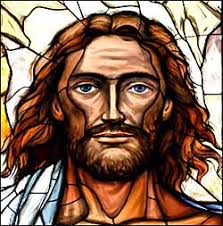 யேசுவா மீது இரண்டு குறிப்பிட்ட குற்றச்சாட்டுகள் இருந்தன. முதலில், ஓய்வுநாளில் பெதஸ்தா குளத்தில் ஊனமுற்றவர்களைக் குணப்படுத்துதல். YHVH வேலை செய்வதை ஒருபோதும் நிறுத்தவில்லை என்பதை சுட்டிக்காட்டி அவர் தனது பாதுகாப்பைத் தொடங்கினார். கர்த்தர் அவர்களிடம் சொன்னார்: என் பிதா இன்றுவரை எப்போதும் அவருடைய வேலையில் இருக்கிறார் (யோவான் 5:17a). “வேலை” என்பது எந்த வகையான செயலையும் உள்ளடக்கியதாக பரிசேய யூத மதம் நம்பியது. யாத்திராகமம் 20:11 ADONAI இன் படி, ஏழாவது நாளில் இஸ்ரவேலர்கள் எந்த வேலையும் செய்ய வேண்டாம் என்று அடோனாய் கட்டளையிட்டார், ஏனென்றால் அவர் படைப்பின் ஆறாம் நாளுக்குப் பிறகு ஓய்வெடுத்தார். இது எலோஹிம் உலகத்தைப் படைத்ததைக் கௌரவிப்பதற்காகவும், அவருடைய ஏற்பாட்டை நினைவுபடுத்துவதற்காகவும் இருந்தது. கர்த்தர் தனது படைப்பு முழுமையடைந்ததால் வேலையை நிறுத்தினார், மேலும் சப்பாத் என்பது எபிரேய வினைச்சொல்லை அடிப்படையாகக் கொண்டது. இருப்பினும், அவர் வழங்குவதையோ பாதுகாப்பதையோ நிறுத்தவில்லை! அந்த வகையில், கடவுள் அவர்களிடமிருந்து ஓய்வெடுப்பதில்லை. சூரியன் உதயமாகிறது மற்றும் மறைகிறது, அலைகள் எழுகின்றன, பாய்கின்றன, மழை பெய்கிறது, காற்று வீசுகிறது, வாராந்திர ஓய்வு நாளில் புல் வளரும். அவருடைய கிருபையின் தொடர்ச்சியான செயல்கள் இல்லாமல், அனைத்து படைப்புகளும் உடனடியாக அழிந்துவிடும்.
யேசுவா மீது இரண்டு குறிப்பிட்ட குற்றச்சாட்டுகள் இருந்தன. முதலில், ஓய்வுநாளில் பெதஸ்தா குளத்தில் ஊனமுற்றவர்களைக் குணப்படுத்துதல். YHVH வேலை செய்வதை ஒருபோதும் நிறுத்தவில்லை என்பதை சுட்டிக்காட்டி அவர் தனது பாதுகாப்பைத் தொடங்கினார். கர்த்தர் அவர்களிடம் சொன்னார்: என் பிதா இன்றுவரை எப்போதும் அவருடைய வேலையில் இருக்கிறார் (யோவான் 5:17a). “வேலை” என்பது எந்த வகையான செயலையும் உள்ளடக்கியதாக பரிசேய யூத மதம் நம்பியது. யாத்திராகமம் 20:11 ADONAI இன் படி, ஏழாவது நாளில் இஸ்ரவேலர்கள் எந்த வேலையும் செய்ய வேண்டாம் என்று அடோனாய் கட்டளையிட்டார், ஏனென்றால் அவர் படைப்பின் ஆறாம் நாளுக்குப் பிறகு ஓய்வெடுத்தார். இது எலோஹிம் உலகத்தைப் படைத்ததைக் கௌரவிப்பதற்காகவும், அவருடைய ஏற்பாட்டை நினைவுபடுத்துவதற்காகவும் இருந்தது. கர்த்தர் தனது படைப்பு முழுமையடைந்ததால் வேலையை நிறுத்தினார், மேலும் சப்பாத் என்பது எபிரேய வினைச்சொல்லை அடிப்படையாகக் கொண்டது. இருப்பினும், அவர் வழங்குவதையோ பாதுகாப்பதையோ நிறுத்தவில்லை! அந்த வகையில், கடவுள் அவர்களிடமிருந்து ஓய்வெடுப்பதில்லை. சூரியன் உதயமாகிறது மற்றும் மறைகிறது, அலைகள் எழுகின்றன, பாய்கின்றன, மழை பெய்கிறது, காற்று வீசுகிறது, வாராந்திர ஓய்வு நாளில் புல் வளரும். அவருடைய கிருபையின் தொடர்ச்சியான செயல்கள் இல்லாமல், அனைத்து படைப்புகளும் உடனடியாக அழிந்துவிடும்.
ஆனால், துரோகியான ரப்பி அதையும் தாண்டி சென்று தந்தையுடன் தனது முழுமையான சமத்துவத்தை நிலைநாட்டினார்: நானும் உழைக்கிறேன் (ஜான் 5:17b). இது சப்பாத்தின் உரிமையின் முழுமையான உரிமைகோரலாகும். தோரா அடோனாயிடமிருந்து வந்ததால் ADONAI, தோரா கடவுளை கண்டிக்க முடியாது. ஏழாம் நாளிலிருந்து சிருஷ்டிகராக அவர் செய்துகொண்டிருந்ததை தேவ குமாரன் வெறுமனே தொடர்ந்து செய்துகொண்டிருந்தார். ஆபிரகாமோ, மோசேயோ, தாவீதோ, தானியேலோ கனவிலும் நினைக்காததை அவர் செய்திருந்தார். யூதத் தலைவர்களிடம் புள்ளி இழக்கப்படவில்லை.
இரண்டாவதாக, தன்னை கடவுளுக்கு சமமாக ஆக்குதல். இந்தக் காரணத்திற்காக அவர்கள் அவரைக் கொல்ல அதிக முயற்சி செய்தார்கள்; அவர் ஓய்வுநாளை மீறியது மட்டுமல்லாமல், அவர் கடவுளைத் தனது சொந்த தந்தை என்றும் அழைத்தார், தன்னை கடவுளுக்கு சமமாக ஆக்கினார் (யோசனன் 5:18). இந்த வசனத்தில் உள்ள அனைத்து வினைச்சொற்களும் அபூரணமானவை, தொடர்ச்சியான செயலை விவரிக்கின்றன. கிறிஸ்துவின் தெய்வீகத்தை மறுக்கும் வழிபாட்டு முறைகளுடன் பயன்படுத்த இது ஒரு நல்ல வசனம். வழிபாட்டு முறைகள் எந்த மகனும் தந்தையை விட குறைவானவர் என்ற தர்க்கத்தைப் பயன்படுத்துகின்றன, எனவே இயேசு வெறுமனே மகனாக இருந்தால், அவர் கடவுளை விட குறைவாக இருப்பார். புறஜாதிகளின் நியாயத்தில் அது உண்மையாக இருக்கலாம், ஆனால் யூத மதத்தில் (சூழல், சூழல், சூழல்) முதல் குழந்தை தந்தைக்கு சமம்! முதல் நூற்றாண்டின் அசல் சிட்ஸ் இம் லேபனை நாம் புரிந்து கொள்ள வேண்டும். வழிபாட்டு முறைகள் கிறிஸ்துவின் தெய்வத்தை மறுக்கும் மற்றொரு வழி, இயேசு ஒருபோதும் கடவுள் என்று சொல்லவில்லை என்று சொல்வது. அல்லது கடவுள் என்று கூறவில்லை. ஆனால், இந்த பத்தியில் யூதர்கள் அவர் என்ன சொல்கிறார் என்பதில் குழப்பம் இல்லை. தந்தையுடன் சமமான உறவைக் கொண்டிருப்பது, ஒருவர் செய்வதை மற்றவர் செய்கிறார். இது மகனின் செயல் என்றால் அது தந்தையின் வேலையும் கூட. அவர்கள் தங்கள் சட்டவிரோத அதிகாரத்திற்கு அவரது சவாலை வெறுத்தனர் மற்றும் அவர்கள் ADONAI உடன் சமம் என்ற அவரது கோரிக்கையை நிராகரித்தனர். எனவே, அவர்கள் அவரைக் கொல்ல அதிக முயற்சி செய்தனர்.
சர்ச்சையின் உண்மையான புள்ளி இதுதான்: ஓய்வுநாளை யார் வைத்திருந்தார்கள்? அந்த கேள்விக்கு ஆறு குறிப்பிட்ட கூற்றுகளுடன் இறைவன் பதிலளித்தார். முதலாவதாக, அரசர்களின் அரசன், “நான் கடவுளுக்குச் சமமானவன்” என்றார். யேசுவா தனது தெய்வத்தின் உண்மையை அவரது காலத்தில் யாரும் தவறவிட முடியாத வகையில் முன்வைத்தார். இயேசு இரட்டை ஆமென் என்று தொடங்கினார், அதாவது அது உண்மை. மெய்யாகவே மெய்யாகவே நான் உங்களுக்குச் சொல்லுகிறேன், குமாரன் தன்னால் ஒன்றும் செய்ய முடியாது. இது எந்த குறைபாடுகளையும் வரம்புகளையும் குறிக்கவில்லை, அதாவது மகன் தந்தையை சாராமல் செயல்பட முடியாது. பின்னர் அவர் கடவுளுடன் சமத்துவம் கோரினார், தன்னை கடவுளின் மகன் என்றும் கடவுளை தனது தந்தை என்றும் குறிப்பிட்டார். பிதா எதைச் செய்கிறாரோ அதையே குமாரனும் செய்கிறார் (யோவான் 5:19). தந்தையும் மகனும் வித்தியாசமான நபர்களாக இருந்தாலும், தந்தையும் மகனும் ஒரே கடவுள். அதுபோல, தந்தையும் மகனும் ஒன்றே; எனவே, திரித்துவத்தின் இந்த இரண்டு நபர்கள் (யோவான் பரிசுத்த ஆவியைப் பற்றி பின்னர் 16:1-15 இல் விவாதிக்கிறார்) ஒருவருக்கொருவர் எதிராக செயல்பட முடியாது. ஏனென்றால், தந்தை குமாரனை நேசிக்கிறார், அவர் செய்வதையெல்லாம் அவருக்குக் காட்டுகிறார். ஆம், நீங்கள் ஆச்சரியப்படும்படி, இவைகளைவிட பெரிய கிரியைகளை அவர் அவருக்குக் காண்பிப்பார் (யோவான் 5:20). மனித உருவில் பூமியில் இருக்கும் தந்தையின் சரியான பிரதிபலிப்பே மகன். அவர் செய்யும் அனைத்தும் தந்தையின் நோக்கங்களையும் செயல்களையும் பிரதிபலிக்கிறது.452
இரண்டாவதாக, ஜீவ அப்பம், “நான் ஜீவனைக் கொடுப்பவன்” என்று கூறியது. பிதா மரித்தோரை உயிர்ப்பித்து அவர்களுக்கு உயிர் கொடுப்பது போல, குமாரனும் தாம் விரும்புகிறவர்களுக்கு ஜீவனைக் கொடுக்கிறார் (யோசனன் 5:21). உயிரைக் கொடுப்பதற்கு, நீங்கள் வாழ்க்கையின் ஆதாரமாக இருக்க வேண்டும். TaNaKh இல் உள்ள யாரும் கடவுளைத் தவிர வேறு உயிரைக் கொடுப்பதாகக் கூறவில்லை. எந்தவொரு சாதாரண மனிதனுக்கும் இது ஒரு அவதூறான கூற்றாக இருக்கும். இறப்பை ஒத்திவைக்க மருத்துவர்கள் மருந்து பரிந்துரைக்கலாம் அல்லது சிகிச்சை அளிக்கலாம், ஆனால் இறந்தவர்களுக்கு உயிர் கொடுக்க முடியாது. இறந்தவர்களை உயிர்த்தெழுப்புவதற்கு ADONAI TaNaKh இன் தீர்க்கதரிசிகளைப் பயன்படுத்தினார், ஆனால், அதற்கான பெருமையை யாரும் கோரவில்லை. ஒன்றுமில்லாத ஒன்றை கடவுள் மட்டுமே உருவாக்க முடியும்: தொடக்கத்தில் கடவுள் வானங்களையும் பூமியையும் படைத்தார் (ஆதி. 1:1). நேசிப்பவர் இறக்கும் போது நாம் ஒருபோதும் உதவியற்றவர்களாக உணர முடியாது. நாம் மருந்து கொண்டு வரலாம், ஓய்வெடுக்கலாம், ஊக்கமும் ஆறுதலும் அளிக்கலாம். சில நிதி உதவி கூட இருக்கலாம். ஆனால், அந்த நபர் இறந்தால், நாம் செய்யக்கூடியது நமது இழப்பை வருத்துவதுதான். உயிரை மீட்டெடுக்கும் சக்தி இறைவனுக்கு மட்டுமே உண்டு.
மூன்றாவதாக, “நானே இறுதி நீதிபதி” என்று தேவ குமாரன் கூறினார். TaNaKh இல் இறுதித் தீர்ப்பு தந்தையாகிய கடவுளுக்கு ஒதுக்கப்பட்டது. இப்போது மகன் நியாயந்தீர்க்கிறார் என்றால், மகன் கடவுளாக இருக்க வேண்டும். மேலும், தந்தை யாரையும் நியாயந்தீர்க்கவில்லை, ஆனால் எல்லா தீர்ப்பையும் மகனிடம் ஒப்படைத்துள்ளார் (வெளிப்படுத்துதல் Fo– தி கிரேட் ஒயிட் த்ரோன் ஜட்ஜ்மென்ட் பற்றிய எனது வர்ணனையைப் பார்க்கவும்), இதற்குக் காரணம், அனைவரும் தந்தையை மதிப்பது போல மகனையும் மதிக்க வேண்டும் என்பதே. குமாரனைக் கனம்பண்ணாதவன் அவனை அனுப்பிய பிதாவைக் கனம்பண்ணுவதில்லை (யோவான் 5:22-23). யேசுவா மட்டுமே இதயத்தின் நோக்கங்களை அறிய முடியும், ஏனென்றால் அவர் எல்லாம் அறிந்தவர். கிறிஸ்து மட்டுமே ஒரு நபரின் மதிப்பை பாசாங்கு இல்லாமல் எடைபோட முடியும், ஏனென்றால் அவர் முற்றிலும் நீதியுள்ளவர். மாஸ்டர் பில்டர் மட்டுமே நம் தலைவிதியை தீர்மானிக்க முடியும், ஏனென்றால் அவர் நம்மை உருவாக்கினார் மற்றும் நம்மீது இறையாண்மை கொண்டவர். பிதாவாகிய கடவுள் எல்லா தீர்ப்பையும் குமாரனாகிய கடவுளிடம் ஒப்படைத்துள்ளார், ஏனென்றால் மகன் தந்தைக்கு சமமானவர். எனவே, கிறிஸ்து தந்தைக்கு உரிய அதே மரியாதைக்கு தகுதியானவர் என்று கூறினார்.
நான்காவதாக, பாவிகளின் மீட்பர் கூறினார், “மனிதகுலத்தின் நித்திய விதியை நான் தீர்மானிப்பேன்.” நித்திய ஜீவனை வழங்கும் வல்லமை யேசுவாவுக்கு உண்டு. TaNaKh இல் நித்திய ஜீவனை வழங்கும் வல்லமை பெற்றவர் கடவுளுக்கு மட்டுமே ஒதுக்கப்பட்டார். எனவே, இயேசுவுக்கு இந்த சக்தி இருந்தால், அவரும் கடவுளாக இருக்க வேண்டும். இறைவன் தனது கூற்றை மீண்டும் ஒருமுறை இரட்டை ஆமீனுடன் நிறுத்தினார். பொதுவாக, பரிசுத்தர் தன்னை நம்பும்படி அழைப்பு விடுத்தார் (யோவான் 3:16); எவ்வாறாயினும், இந்த விஷயத்தில் தந்தை மற்றும் மகனின் முழுமையான ஒற்றுமையின் கருப்பொருளை வலுப்படுத்த தந்தையின் மீதான நம்பிக்கைக்கு அவர் அழைப்பு விடுத்தார். ஒன்றை நம்புவது மற்றொன்றை நம்புவதாகும். உண்மையாகவே, உண்மையாகவே நான் உங்களுக்குச் சொல்கிறேன், என் வார்த்தையைக் கேட்டு, என்னை அனுப்பியவரை விசுவாசிக்கிறவனுக்கு நித்திய ஜீவன் உண்டு (பார்க்க Ms – விசுவாசியின் நித்திய பாதுகாப்பு) மற்றும் நியாயந்தீர்க்கப்பட மாட்டார், ஆனால் மரணத்திலிருந்து ஜீவனுக்குக் கடந்துவிட்டார் (யோவான் 5:24) . நாம் ஒருபோதும் இறக்க மாட்டோம், கடவுளின் பிரசன்னத்திற்கு எங்கள் முகவரியை மாற்றுவோம். நித்திய ஜீவன் ஒரு நியாயமான அடிப்படையில் மட்டுமே தற்போதைய நிலையில் இருக்க முடியும். நீதிமான்களாக்கப்படுவது என்பது நீதிமான்களாக அறிவிக்கப்படுவதைக் குறிக்கிறது. நாம் இரட்சிக்கப்பட்ட தருணத்தில் [ஏற்கனவே] நியாயப்படுத்தப்பட்டிருப்பதால் நாம் நித்தியமாக நீதிமான்களாக இருக்கிறோம் (பார்க்க Bw – விசுவாசத்தின் தருணத்தில் கடவுள் நமக்காக என்ன செய்கிறார் என்பதைப் பார்க்கவும்).
பல விசுவாசிகள் கோபமான கடவுளை எதிர்கொள்ளும் வாய்ப்பை பயப்படுகிறார்கள்; அவர் பரிசுத்தமானவர், நாம் பாவம் செய்தவர்கள் என்பதை அறிவது. நாங்கள் [ஏற்கனவே] நியாயப்படுத்தப்பட்டுள்ளோம் என்ற உண்மையை அவர்கள் புரிந்து கொள்ளவில்லை. கிரேக்க மொழி நமது நியாயப்படுத்தலின் கருத்தை மிகத் தெளிவாக்குகிறது. வினைச்சொற்களின் துல்லியம் காரணமாக, ஏற்கனவே ஏதாவது செய்யப்பட்டுள்ளது (கடந்த காலம்), செய்யப்படுகிறது (நிகழ்காலம்), செய்யப்படும் (எதிர்காலம்) மற்றும் தொடர்ச்சியான செயல் (அபூரண காலம்) ஆகியவற்றை விவரிப்பதில் மொழி தெளிவாக உள்ளது. . ரோமர் 5:1ல், நம்முடைய பரிசுத்த பிதாவுக்கு முன்பாக நாம் [ஏற்கனவே] நீதிமான்களாக்கப்பட்டிருக்கிறோம், ஏனென்றால் நம்முடைய பாவங்களுக்கான தண்டனையை இயேசு [ஏற்கனவே] செலுத்தி, கடவுளோடு நம்முடைய சமாதானத்தை நிலைநாட்டியிருக்கிறார். ரோமர் 5:1 இன் கிரேக்க வாசகம் டிகாயோதென்டெஸ் என்று தொடங்குகிறது, அதாவது நியாயப்படுத்தப்பட்டது. வினைச்சொல் ஒரு உச்சநிலை aorist, passive participle, இது ஒரு செயலின் முடிவை வலியுறுத்துகிறது, குறிப்பாக அதிலிருந்து வரும் முடிவுகளை வலியுறுத்துகிறது. 453 எனவே, விசுவாசத்தின் மூலம் நாம் நீதிமான்களாக்கப்பட்டதால், நம்முடைய கர்த்தராகிய இயேசு கிறிஸ்து மூலம் நாம் [ஏற்கனவே] கடவுளுடன் சமாதானமாக இருக்கிறோம். (ரோமர் 5:1).
ஏதாவது [ஏற்கனவே] செய்துவிட்டால், நீங்கள் செய்ய எதுவும் இல்லை. பல விசுவாசிகள் தாங்கள் ஏற்கனவே இருக்கும் ஒன்றாக மாற தீவிரமாக முயற்சி செய்கிறார்கள். கிறிஸ்து உங்களுக்காக ஏற்கனவே செய்ததை உங்களால் செய்ய முடியாது என்று பைபிள் அறிவிக்கிறது. மேசியா ஏற்கனவே செய்ததை நீங்கள் செயல்தவிர்க்க முடியாது என்பது மற்றொரு வழி. சாத்தானின் பொய் என்னவென்றால், நீங்கள் ஏதாவது ஒரு வகையான செயல்களால் உங்கள் பாவத்திற்குப் பரிகாரம் செய்து, கடவுள் மீதான உங்கள் அன்பை நிரூபிக்க வேண்டும்.454
ரோமன் கத்தோலிக்க திருச்சபை ஒரு கோட்பாட்டை உருவாக்கியுள்ளது, அதில் பரிபூரணமாக இல்லாத அனைவரும் தண்டனை மற்றும் சுத்திகரிப்பு துன்பத்தை சுத்திகரிப்பு என்று அழைக்கப்படும் ஒரு இடைநிலை மண்டலத்தில் அனுபவிக்க வேண்டும். கடவுள் பாவத்தை மன்னிக்கிறார் என்ற அனுமானத்தின் அடிப்படையில் இந்த கோட்பாடு உள்ளது, இருப்பினும், பாவி பரலோகத்தில் அனுமதிக்கப்படுவதற்கு முன் முழு தண்டனையையும் அனுபவிக்க வேண்டும் என்று அவரது நீதி கோருகிறது. கத்தோலிக்க திருச்சபையின் கூற்றுப்படி, சுத்திகரிப்பு நெருப்பு நரகத்தின் நெருப்பிலிருந்து வேறுபடுவதில்லை, காலத்தைத் தவிர. கத்தோலிக்க மதம் பயத்தின் மதம் என்று கூறப்படுகிறது – பாதிரியாருக்கு பயம், ஒப்புதல் வாக்குமூலத்திற்கு பயம், காணாமல் போனதால் ஏற்படும் விளைவுகளுக்கு பயம், தவத்தின் ஒழுக்கத்திற்கு பயம், மரண பயம், சுத்திகரிப்பு பயம் மற்றும் பயம். கோபமான கடவுளின் நீதியான தீர்ப்பு.455
எவ்வாறாயினும், இந்த பயம் அனைத்தும் தேவையற்றது, ஏனென்றால் கிறிஸ்து [ஏற்கனவே] விசுவாசத்தில் தம்முடைய நீதியை நமக்குக் கணக்கிட்டுள்ளார் (ரோமர் 5:2-19). ஒரு ஆன்மீக வங்கிக் கணக்கைப் போலவே, மேசியா தனது எல்லா நீதியையும் சுமத்தியுள்ளார் அல்லது நமக்கு மாற்றியுள்ளார். இதன் விளைவாக, நாங்கள் [ஏற்கனவே] எங்கள் விசுவாசத்தால் நியாயப்படுத்தப்பட்டிருக்கிறோம். இதன் விளைவாக, இரட்சிப்புக்குப் பிறகு ADONAI நம்மைப் பார்க்கும்போது. அவர் நம் பாவத்தைப் பார்ப்பதில்லை. . . அவர் தனது மகனைப் பார்க்கிறார்.
ஐந்தாவது, அற்புதம் செய்யும் ரபி, “இறந்தவர்களை நான் எழுப்புவேன்” என்றார். இயேசுவே மரித்தோரின் உயிர்த்தெழுதலைக் கொண்டுவருவார். TaNaKh இல், கடவுள் மட்டுமே இறந்தவர்களின் உயிர்த்தெழுதலைக் கொண்டு வந்தார். எனவே இறந்தவர்களின் உயிர்த்தெழுதலை யேசுவா கொண்டு வர முடிந்தால், அவர் கடவுளாக இருக்க வேண்டும். மிகவும் உண்மையாகவே நான் உங்களுக்குச் சொல்கிறேன், இறந்தவர்கள் கடவுளுடைய குமாரனின் சத்தத்தைக் கேட்கும் (அவருடைய தெய்வத்தை வலியுறுத்தும்) மற்றும் கேட்பவர்கள் வாழ்வார்கள் ஒரு காலம் வருகிறது, இப்போது வந்துவிட்டது. பிதா தம்மில் ஜீவனைக் கொண்டிருப்பதுபோல, குமாரனும் தம்மில் ஜீவனைப் பெற அவர் அருளினார். மேலும் அவர் மனுஷகுமாரன் (அவருடைய மனுஷீகத்தை வலியுறுத்துகிறார்) (யோவான் 5:25-27) YHVH என்பதால் நியாயந்தீர்க்க அவருக்கு அதிகாரம் கொடுத்திருக்கிறார். எல்லா மனிதகுலத்தையும் நியாயந்தீர்ப்பதற்கான யேசுவாவின் தகுதியை உறுதிப்படுத்தியது, ஏனென்றால் அவர் கடவுளின் குமாரன், ஜீவனைக் கொடுக்கக்கூடியவர், மற்றும் மனித குமாரன், மனிதனாக வாழ்க்கையை அனுபவித்தாலும் பாவம் செய்யவில்லை.456
இயேசுவின் குரலை அனைவரும் கேட்கும் காலம் வரும். மற்ற குரல்கள் அனைத்தும் அடக்கப்படும் நாள்; அவரது குரல் – மற்றும் அவரது குரல் மட்டுமே – கேட்கப்படும். சிலர் அவருடைய குரலை முதல்முறையாகக் கேட்பார்கள். அவர் ஒருபோதும் பேசவில்லை என்பதல்ல, அவர்கள் ஒருபோதும் கேட்கவில்லை என்பதுதான். இவர்களுக்கு, கடவுளின் குரல் அந்நியனின் குரலாக இருக்கும். அவர்கள் அதை ஒரு முறை கேட்பார்கள் – மீண்டும் கேட்க மாட்டார்கள். அவர்கள் பூமியில் பின்பற்றிய “குரலை” தடுக்க நித்தியத்தை செலவிடுவார்கள். ஆனால், மற்றவர்கள் தங்கள் கல்லறையிலிருந்து ஒரு பழக்கமான குரலால் அழைக்கப்படுவார்கள். ஏனென்றால், அவர்கள் தங்கள் மேய்ப்பனை அறிந்த ஆடுகள். அவர்கள் பரிசுத்த ஆவியானவர் தட்டியபோது கதவைத் திறந்த ஊழியர்கள்.ஒரு நாள் அந்த கதவு மீண்டும் திறக்கப்படும். இந்த நேரத்தில் மட்டும், நம் வீட்டிற்குள் நுழைவது இயேசுவாக இருக்க மாட்டார்; அவனது 457-க்குள் நடப்பது நாமாகத்தான் இருக்கும் யோவான் 5:28-29 ல் கர்த்தர் யூதத் தலைவர்களிடம் சொன்னார்: இதைப் பார்த்து ஆச்சரியப்பட வேண்டாம், ஏனென்றால், தங்கள் கல்லறைகளில் உள்ள அனைவரும் அவருடைய குரலைக் கேட்டு, நல்லதைச் செய்தவர்கள் வெளியே வரும் ஒரு காலம் வருகிறது. (ஜேம்ஸ் 2:14-26) வாழ்வதற்கு உயர்வார்கள் (வெளிப்படுத்துதல் Ff – பற்றிய எனது வர்ணனையைப் பார்க்கவும் – முதல் உயிர்த்தெழுதலில் பங்கு பெற்றவர்கள் ஆசீர்வதிக்கப்பட்டவர்கள் மற்றும் பரிசுத்தமானவர்கள்), மேலும் தீமைகளைச் செய்தவர்கள் கண்டிக்கப்படுவார்கள் (வெளிப்படுத்துதல் Fn – இரண்டாவது உயிர்த்தெழுதல் பற்றிய எனது வர்ணனையைப் பார்க்கவும்).
ஆறாவது, யேசுவா பென் டேவிட் கூறினார், “நான் எப்பொழுதும் எலோஹிம் சித்தத்தைச் செய்கிறேன்.” மேசியாவின் இறுதிக் கூற்றில், பூமியில் அவர் செய்த செயல்களை பரலோகத்திலுள்ள அவரது தந்தையின் விருப்பத்துடன் இணைத்தார். இப்போது பார்வையில் திடீர் மாற்றம் ஏற்பட்டுள்ளது. யூத மதத் தலைவர்களுடனான அவரது மோதல் முழுவதும், கலிலியன் ரபி தன்னை மூன்றாவது நபராகக் குறிப்பிட்டு, கடவுளின் மகன் மற்றும் மனித குமாரன் போன்ற பட்டங்களைப் பயன்படுத்திக் கொண்டார். ஆனால், தனக்கும் யூதத் தலைவர்களுக்கும் இடையிலான மோதலின் அடுத்த கட்டத்திற்கு அவர் மாறும்போது (பார்க்க Cu – நீங்கள் மோசேயை நம்பினால், நீங்கள் என்னை நம்புவீர்கள்), அவர் தனது அசல் கூற்றை 19 ஆம் வசனத்திலிருந்து மீண்டும் கூறுகிறார், முதல் நபரில் மட்டுமே பேசுகிறார்: மூலம் நானே ஒன்றும் செய்ய முடியாது; நான் கேட்கிறபடியே நியாயந்தீர்க்கிறேன், என் நியாயத்தீர்ப்பு நியாயமானது, ஏனென்றால் நான் என்னையே அல்ல, என்னை அனுப்பினவரையே பிரியப்படுத்த விரும்புகிறேன் (யோசனன் 5:30). அவருடைய கருத்து தெளிவாக இருந்தது, அவர் வேறு யாரையும் குறிப்பிடவில்லை; அவர் தன்னைப் பற்றிய கூற்றுகளைச் செய்து கொண்டிருந்தார். இது அவரது எதிர்ப்பாளர்களுக்கு சமரசத்திற்கு இடமில்லாமல் போய்விட்டது. இன்று நமக்கும் அப்படித்தான். அவருடைய அறிவிப்பை நாம் ஏற்க வேண்டும் அல்லது நிராகரிக்க வேண்டும்.
அன்புள்ள பரலோகத் தகப்பனே, நான் நியாயப்படுத்தப்படுவதற்காக விலையைச் செலுத்த உமது ஒரே மகனை அனுப்பியதற்காக உமக்கு நன்றி. என் கர்த்தராகிய இயேசு கிறிஸ்துவின் மூலமாக நான் உங்களோடு சமாதானம் அடைந்திருக்கிறேன் என்பதை இப்போது விசுவாசத்தினால் ஏற்றுக்கொள்கிறேன். நாங்கள் எதிரிகள் என்ற பொய்யைத் துறந்து, நாங்கள் நண்பர்கள் என்ற உண்மையைக் கூறுகிறேன், உங்கள் மகனின் மரணத்தால் சமரசம் செய்துகொள்கிறேன். நான் இப்போது மேசியாவில் உள்ள வாழ்க்கையில் மகிழ்ச்சியடைகிறேன், நான் உங்களை நேருக்கு நேர் காணும் நாளை எதிர்நோக்குகிறேன். யேசுவாவின் அருமையான பெயரில் நான் பிரார்த்தனை செய்கிறேன். ஆமென்.458



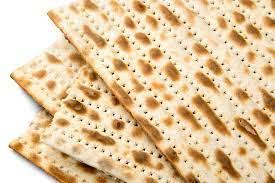
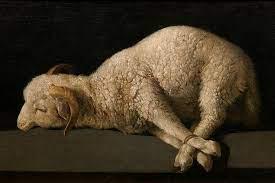
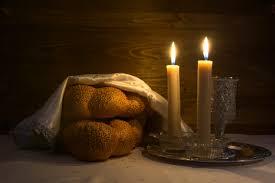
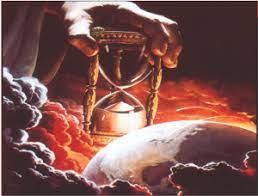
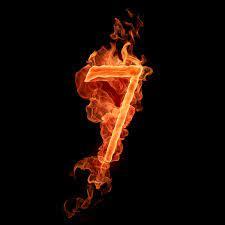


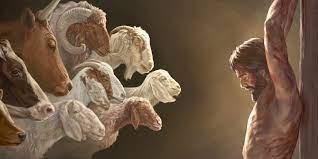

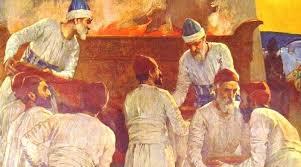
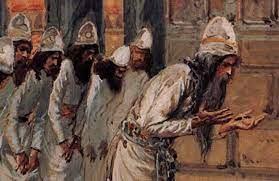
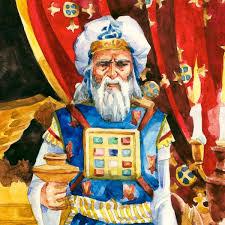
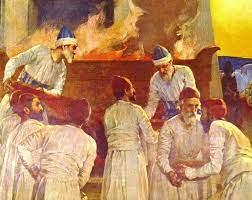
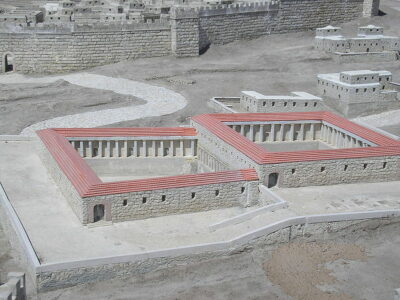 அன்று யேசுவாவின் மனதில் இரண்டு வித்தியாசமான படங்கள் இருந்தன. ஒருபுறம், ஏராளமான ஊனமுற்றோர், பார்வையற்றோர், ஊனமுற்றோர், முடமானோர் படுத்துக்கிடந்தனர் (யோசனன் 5:3). அவர்களின் துன்பங்களும் தவறான எதிர்பார்ப்புகளும் ரொட்டிக்காக பட்டினி கிடப்பவர்களின் அலறல் போல எழுந்தன. மறுபுறம், பக்கத்து ஆலயம், அதன் ஆசாரியத்துவம் மற்றும் ஆசிரியர்களுடன், அவர்களின் சுய-தேடும் வாய்வழிச் சட்டத்தில் (
அன்று யேசுவாவின் மனதில் இரண்டு வித்தியாசமான படங்கள் இருந்தன. ஒருபுறம், ஏராளமான ஊனமுற்றோர், பார்வையற்றோர், ஊனமுற்றோர், முடமானோர் படுத்துக்கிடந்தனர் (யோசனன் 5:3). அவர்களின் துன்பங்களும் தவறான எதிர்பார்ப்புகளும் ரொட்டிக்காக பட்டினி கிடப்பவர்களின் அலறல் போல எழுந்தன. மறுபுறம், பக்கத்து ஆலயம், அதன் ஆசாரியத்துவம் மற்றும் ஆசிரியர்களுடன், அவர்களின் சுய-தேடும் வாய்வழிச் சட்டத்தில் (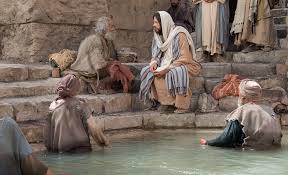
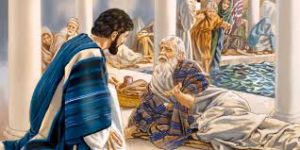 TaNaKh இல், நாம் ஓய்வுநாளை புனிதமாக கடைப்பிடித்து அதை சப்பாத்தை பரிசுத்தமாக வைத்து அதை நினைவு செய்யுங்கள், அந்த நாளில் ஒரு மனிதனோ அல்லது அவனது வேலையாட்களோ அல்லது அவரது விலங்குகளோ எந்த வேலையும் செய்யக்கூடாது என்று எளிமையாகக் கூறப்பட்டுள்ளது. அதோடு திருப்தியடையாமல், யூதர்கள் மணிநேரத்திற்கு மணிநேரம் மற்றும் தலைமுறை தலைமுறையாக வேலை என்ன என்பதை வரையறுத்து, ஓய்வுநாளில் செய்யக்கூடிய அல்லது செய்ய முடியாத விஷயங்களைப் பட்டியலிட்டனர். கி.பி 200 இல் வாய்வழி சட்டம் எழுதப்பட்டது, இன்று அது மிஷ்னா என்று அழைக்கப்படுகிறது. வேதபாரகர்கள் இந்த ஒழுங்குமுறைகளை உருவாக்கினர் மற்றும் பரிசேயர்கள் அவற்றைக் கடைப்பிடிப்பதற்காக தங்கள் வாழ்க்கையை அர்ப்பணித்தனர். மிஷ்னாவில் ஓய்வுநாளின் பகுதி இருபத்து நான்கு அத்தியாயங்களுக்குக் குறையாமல் நீட்டிக்கப்படுகிறது. டால்முட் என்பது மிஷ்னாவின் வர்ணனையாகும், மேலும் ஜெருசலேம் டால்முடில் சப்பாத் சட்டத்தை விளக்கும் பகுதி அறுபத்து நான்கரை நெடுவரிசைகளுக்கு செல்கிறது; மற்றும் பாபிலோனிய டால்முட்டில் இது நூற்று ஐம்பத்தாறு இரட்டை ஃபோலியோ பக்கங்கள் வரை இயங்கும். மேலும் மிஷ்னாவில் உள்ள இருபத்து நான்கு அத்தியாயங்களில் ஒன்றை படிப்பதில் இரண்டரை ஆண்டுகள் செலவழித்த ஒரு ரபியைப் பற்றி நாம் கூறுகிறோம்.
TaNaKh இல், நாம் ஓய்வுநாளை புனிதமாக கடைப்பிடித்து அதை சப்பாத்தை பரிசுத்தமாக வைத்து அதை நினைவு செய்யுங்கள், அந்த நாளில் ஒரு மனிதனோ அல்லது அவனது வேலையாட்களோ அல்லது அவரது விலங்குகளோ எந்த வேலையும் செய்யக்கூடாது என்று எளிமையாகக் கூறப்பட்டுள்ளது. அதோடு திருப்தியடையாமல், யூதர்கள் மணிநேரத்திற்கு மணிநேரம் மற்றும் தலைமுறை தலைமுறையாக வேலை என்ன என்பதை வரையறுத்து, ஓய்வுநாளில் செய்யக்கூடிய அல்லது செய்ய முடியாத விஷயங்களைப் பட்டியலிட்டனர். கி.பி 200 இல் வாய்வழி சட்டம் எழுதப்பட்டது, இன்று அது மிஷ்னா என்று அழைக்கப்படுகிறது. வேதபாரகர்கள் இந்த ஒழுங்குமுறைகளை உருவாக்கினர் மற்றும் பரிசேயர்கள் அவற்றைக் கடைப்பிடிப்பதற்காக தங்கள் வாழ்க்கையை அர்ப்பணித்தனர். மிஷ்னாவில் ஓய்வுநாளின் பகுதி இருபத்து நான்கு அத்தியாயங்களுக்குக் குறையாமல் நீட்டிக்கப்படுகிறது. டால்முட் என்பது மிஷ்னாவின் வர்ணனையாகும், மேலும் ஜெருசலேம் டால்முடில் சப்பாத் சட்டத்தை விளக்கும் பகுதி அறுபத்து நான்கரை நெடுவரிசைகளுக்கு செல்கிறது; மற்றும் பாபிலோனிய டால்முட்டில் இது நூற்று ஐம்பத்தாறு இரட்டை ஃபோலியோ பக்கங்கள் வரை இயங்கும். மேலும் மிஷ்னாவில் உள்ள இருபத்து நான்கு அத்தியாயங்களில் ஒன்றை படிப்பதில் இரண்டரை ஆண்டுகள் செலவழித்த ஒரு ரபியைப் பற்றி நாம் கூறுகிறோம்.
